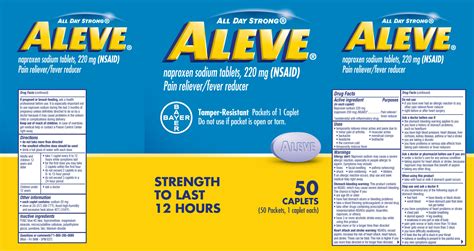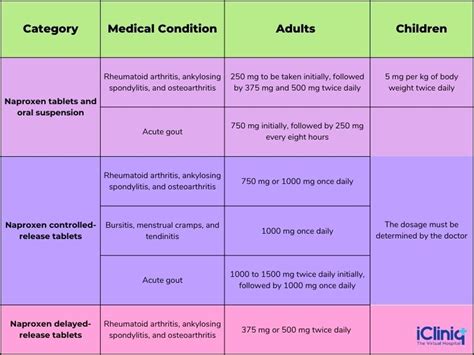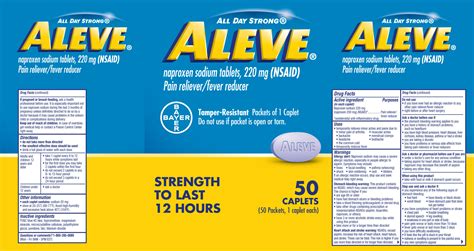Intro
Discover what Naproxen is, a nonsteroidal anti-inflammatory drug (NSAID) used for pain relief, reducing inflammation, and treating conditions like arthritis, menstrual cramps, and muscle aches.
Naproxen is a type of nonsteroidal anti-inflammatory drug (NSAID) that is commonly used to relieve pain, reduce inflammation, and lower fever. It works by inhibiting the production of prostaglandins, which are hormone-like substances that cause pain and inflammation in the body. Naproxen is available over-the-counter (OTC) under various brand names, such as Aleve, and is also available by prescription for more severe cases.
The importance of understanding naproxen and its uses cannot be overstated. With the rise of chronic pain and inflammatory conditions, such as arthritis, many people are turning to naproxen as a way to manage their symptoms and improve their quality of life. However, it is crucial to use naproxen responsibly and under the guidance of a healthcare professional to minimize the risk of side effects and interactions with other medications.
As we delve into the world of naproxen, it is essential to explore its benefits, working mechanisms, and potential risks. By doing so, we can gain a deeper understanding of how this medication works and how it can be used to alleviate pain and inflammation. Whether you are a healthcare professional or an individual seeking to manage your symptoms, this article aims to provide a comprehensive overview of naproxen and its uses.
What is Naproxen Used For?

How Does Naproxen Work?
Naproxen works by inhibiting the production of prostaglandins, which are hormone-like substances that cause pain and inflammation in the body. Prostaglandins are produced by the body's enzymes, called cyclooxygenase (COX) enzymes. Naproxen blocks the production of prostaglandins by inhibiting the COX enzymes, which reduces pain and inflammation. Naproxen also has anti-inflammatory properties, which help to reduce swelling and redness in the affected area.Benefits of Naproxen

Side Effects of Naproxen
While naproxen is generally well-tolerated, it can cause side effects, especially when taken in high doses or for extended periods. Some common side effects of naproxen include: * Stomach upset and nausea * Diarrhea and constipation * Headaches and dizziness * Drowsiness and fatigue * Increased risk of bleeding and bruisingHow to Take Naproxen

Naproxen Interactions
Naproxen can interact with other medications, including: * Blood thinners, such as warfarin * Other NSAIDs, such as ibuprofen * Steroids, such as prednisone * Certain antidepressants, such as selective serotonin reuptake inhibitors (SSRIs) * Certain blood pressure medications, such as diureticsNaproxen Dosage

Naproxen Overdose
Taking too much naproxen can lead to serious side effects, including stomach ulcers, kidney damage, and increased risk of bleeding. If you suspect an overdose, seek medical attention immediately.Naproxen and Pregnancy

Naproxen and Breastfeeding
Naproxen is excreted in breast milk, and it is not recommended for breastfeeding mothers. Naproxen can pass into breast milk and cause side effects in the baby, such as stomach upset and allergic reactions.Naproxen Alternatives

Naproxen and Other Medications
Naproxen can interact with other medications, including: * Antidepressants * Blood pressure medications * Diabetes medications * Seizure medications * SteroidsWhat is the recommended dosage of naproxen for osteoarthritis?
+The recommended dosage of naproxen for osteoarthritis is 500-1000 mg per day.
Can I take naproxen with other NSAIDs?
+No, you should not take naproxen with other NSAIDs, as this can increase the risk of side effects and interactions.
Is naproxen safe to take during pregnancy?
+No, naproxen is not recommended during pregnancy, especially during the third trimester, as it can increase the risk of premature birth and other complications.
In conclusion, naproxen is a powerful medication that can provide fast and effective pain relief and reduce inflammation. However, it is essential to use naproxen responsibly and under the guidance of a healthcare professional to minimize the risk of side effects and interactions with other medications. By understanding the benefits, working mechanisms, and potential risks of naproxen, individuals can make informed decisions about their treatment options and take control of their health. We invite you to share your thoughts and experiences with naproxen in the comments below and to explore other articles on our website for more information on pain management and inflammatory conditions.
